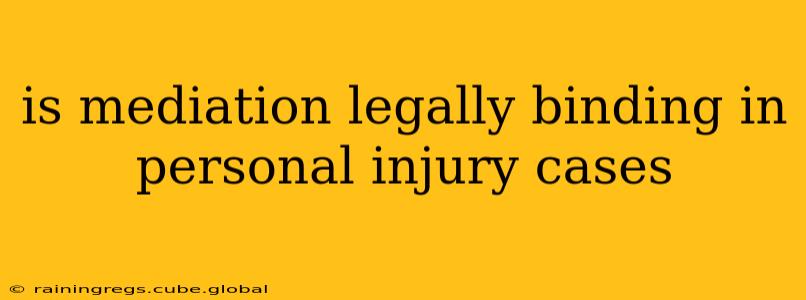Mediation is a popular alternative dispute resolution (ADR) method often used in personal injury cases. But a common question arises: is a mediation agreement legally binding? The short answer is: it depends. While mediation itself isn't legally binding in the sense that a judge doesn't force participation, the agreement reached during mediation can be legally binding if certain conditions are met. Understanding these nuances is crucial for anyone involved in a personal injury case considering mediation.
What Happens During Mediation in Personal Injury Cases?
Before diving into the legal binding nature of mediation agreements, let's briefly review the mediation process in personal injury cases. In mediation, a neutral third party, the mediator, facilitates communication between the injured party (plaintiff) and the at-fault party (defendant) or their insurance company. The mediator doesn't decide the outcome; instead, they guide the parties toward a mutually agreeable settlement. The goal is to reach a compromise that avoids a costly and time-consuming trial.
The process typically involves:
- Opening statements: Each party presents their perspective on the case.
- Caucus: The mediator meets separately with each party to explore their interests and concerns.
- Negotiation: The mediator facilitates communication and negotiation between the parties.
- Settlement agreement: If a settlement is reached, it's documented in writing.
Is a Mediation Agreement Legally Binding?
The legal binding nature of a mediation agreement hinges on the following:
-
The agreement itself: A well-drafted settlement agreement clearly outlines the terms of the settlement, including the amount of compensation, the release of liability, and any other relevant conditions. It must be signed by all parties involved. A poorly written or incomplete agreement can be challenged.
-
Consideration: Both parties must provide consideration—something of value—to make the agreement legally binding. This is usually the financial settlement for the injured party and the release from further legal action for the at-fault party.
-
Capacity: All parties must have the legal capacity to enter into a contract. This means they must be of legal age and mentally competent to understand the terms of the agreement.
-
Enforceability: The agreement must be lawful and not violate public policy. For example, an agreement to conceal criminal activity would not be enforceable.
What Happens if One Party Breaches the Agreement?
If one party breaches the mediation agreement, the other party can enforce the agreement through the courts. This might involve filing a motion to enforce the settlement agreement, which could lead to sanctions against the breaching party, such as paying damages or facing contempt of court.
What if I'm Unsure if Mediation is Right for Me?
Mediation is not suitable for every personal injury case. It's best suited for situations where both parties are willing to compromise and seek a resolution outside of court. If you're unsure if mediation is right for you, it's always advisable to seek legal counsel. An attorney can help you weigh the pros and cons of mediation and guide you through the process.
Can I Withdraw from Mediation?
Yes, you can generally withdraw from mediation at any time before a formal settlement agreement is signed. However, withdrawing after a settlement has been reached and signed could have legal consequences.
What are the Benefits of Mediation in Personal Injury Cases?
- Cost-effectiveness: Mediation is generally less expensive than going to trial.
- Faster resolution: Mediation can resolve cases much faster than litigation.
- More control: Parties have more control over the outcome in mediation.
- Preservation of relationships: Mediation can help preserve relationships between the parties.
This information is for general informational purposes only and does not constitute legal advice. You should consult with an attorney for advice tailored to your specific situation.
